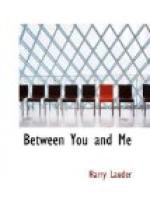Weel, then, what I’m meaning is that those great actors and actresses, before they come to the halls to show us old timers what’s what, and how to get applause, have a solid record of hard work behind them. And still some of them think the halls are different, and that there they’ll be clapped and cheered just because of their reputations. They’d be astonished tae hear the sort of talk goes on in the gallery of the Pav., in London—just for a sample. I’ve heard!
“Gaw bli’me, Alf—’oo’s this toff? Comes on next. ’Mr. Arthur Andrews, the Celebrated Shakespearian Actor.’”
“Never heard on him,” says Alf, indifferently.
And so it goes. Mr. Andrews appears, smiling, self-possessed, waiting gracefully for the accustomed thunders of applause to subside. Sometimes he gets a round or two—from the stalls. More often he doesn’t. Music hall audiences give their applause after the turn, not before, as a rule, save when some special favorite like Miss Vesta Tilley or Mr. Albert Chevalier or—oh, I micht as weel say it like old Harry Lauder!—comes on!
And then Mr. Andrews, too often, goes stiffly through a scene from a play, or gives a dramatic recitation. In its place what he does would be splendid, and would be splendidly received. The trouble, too often, is that he does not realize that he must work to please this new audience. If he does, his regard will be rich in the event of success. I dinna mean just the siller he will earn, either.
It’s true, I think, that there’s a better living, for the really successful artist, in varieties than there is on the stage. There’s more certainty—less of a speculative, dubious element, such as ye canna escape when there’s a play involved. The best and most famous actors in the world canna keep a play frae being a failure if the public does not tak’ to it. But in the halls a good turn’s a good turn, and it can be used longer than even the most successful plays can run.
But still, it’s no just the siller I was thinking of when I spoke of the rich rewards of a real success in the halls. An artist makes real friends there—warm-hearted, personal friends, who become interested in him and his career; who think of him, and as like as not, call him by his first name. Oh—aye, I’ve known artists who were offended by that! I mind a famous actor who was with me once when I was taking a walk in London, and a dozen costers, recognizing me, wished me good luck—it was just before I was tae mak’ my first visit to America.
It was “Good luck, Harry,” and “God bless you, Harry!” frae them. ’Deed, and it warmed the cockles of my heart to hear them! But my friend was quite shocked.
“I say, Harry—do you know those persons?” he said.
“Never saw them before,” I told him, cheerfully.
“But they addressed you in the most familiar fashion,” he persisted.
“And why not?” I asked. “I never saw them before—but they’ve seen me, thanks be! And as for familiarity—they helped to buy the shoon and the claes I’m wearing! They paid for the parritch I had for breakfast, and the bit o’ beef I’ll be eating for my dinner. If it wasna for them and the likes of them I’d still be digging coal i’ the pit in Scotland! It’ll be the sair day for me when they call me Mr. Lauder!”




